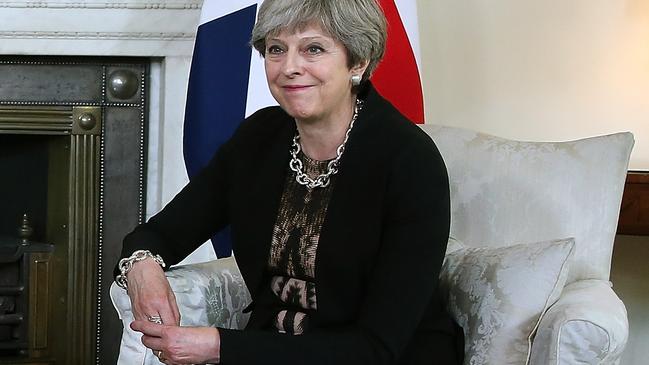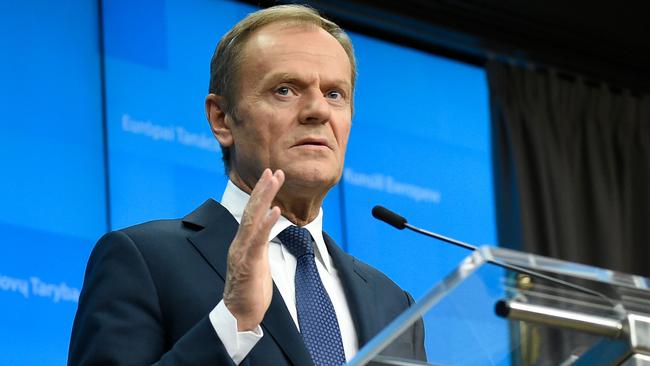Brexit: Theresa May banished to table for one as EU leaders met
For six hours she sat alone while a few feet away, behind closed doors, European leaders bickered over her country’s future.

For six hours she sat in an office of the European Council building while a few feet away, behind the closed doors of the chamber, European leaders bickered over her country’s future.
Dismissed after two hours of pointed and sometimes hostile questioning, Theresa May was left, like everyone else, relying largely on Twitter for leaks from the council chamber.
The only nod to her position was the offer from officials to bring up the same food as that being served to the EU 27. She declined, choosing from a different menu.
It was a culinary decision wrapped in symbolism.
In the chamber where her request for a three-month extension was being debated, President Macron of France said that before he heard Mrs May’s address he thought she only had a 10 per cent chance of winning the vote next week. Now he believed that there was a 95 per cent probability that she would lose.
He was interrupted by Donald Tusk, president of the European Council, who wryly observed that the odds were even worse, with an almost 100 per cent certainty that she would be defeated.
President Macron continued, arguing that given Mrs May’s grim prospects, the EU must take control by making a decision now rather than leaving it to a chaotic summit on March 28. Charles Michel, the Belgian prime minister, rallied behind Mr Macron, and told the meeting, which was already beginning to drag over time, that nothing but a “miracle” could prevent Mrs May’s defeat.
“It might just be better for Britain to just leave on March 29,” he said, citing preparedness planning, particularly by businesses, for a no-deal Brexit.
Viktor Orban, the autocratic and proudly illiberal Hungarian prime minister, said that no deal was a real possibility because he had learnt from the experience of Margaret Thatcher that all
Tory leaders only cared about one thing: the Conservative Party.

Europe’s leaders dismissed Mrs May’s request for a three-month delay.
Officials had hoped that the summit would swiftly sign off a draft counter-offer of an extension deadline of May 22, the day before the mandatory date for EU elections in Britain.
As talks began to run into extra time, it became clear that if a decision was going to be taken, then negotiations between EU leaders were going to have to continue over dinner and into the night. Ditching the schedule, which directed them to discuss China with Mrs May present, EU leaders settled down over their dinner of langoustine and lentil terrine follow by roast duckling a l’orange.
In his shirtsleeves and with great relish, Mr Macron sought to stamp his authority on the talks which span out of control with, at one point, at least four extension dates swirling around the room. The atmosphere was strained and marked by tension between France and Germany.
Angela Merkel, the German chancellor, clashed with Mr Macron and Mr Michel over their insistence that the EU should not shrink from a no-deal Brexit if Britain was unable to ratify the withdrawal treaty in three weeks.
While saying that German industry — particularly carmakers — was prepared for the worst, she vowed to work “until the last hour” to avoid a no-deal that would poison relations between Britain and the EU for years. “History will not be kind to us if it happens,” she said.
Mrs Merkel clashed with Leo Varadkar, the Irish prime minister. “He stood up to repeat his ritual plea for EU solidarity with Ireland over the border,” a diplomat said. “She came straight back at him, reminding him that without a deal there would be no Irish backstop. She asked why so close to Brexit day, the EU had not drawn up emergency plans to avoid a hard border and urged officials to get a move on.”
Jeppe Tranholm-Mikkelsen, the secretary-general of the Council of the EU, stepped to find the compromise that balanced the French and German positions with hard deadlines and flexibility to prevent a no-deal Brexit.
As the hours went by the British delegation’s hopes rose and then faded as extension options came and went. At one stage they believed that EU leaders would go with a French proposal to set May 7 as the absolute deadline to resolve Brexit. “That would have put us in a very challenging situation,” said one person in the room. “We were following it like everyone else from well informed leaks from the room on Twitter and trying to work out how to respond in a very fluid situation.”
Press statements were drafted and redrafted. Pizza was ordered.
Mrs May, who worked on her red boxes as aides updated her on the latest developments, finally got clarity on the “flextension” plan from Mr Tusk.
When a draft plan had been put on the table just before dinner he came up to the British delegation’s suite to ask if the prime minister would sign up to it. He then came back after the final deal was struck to present the legal wording of the text. It gives Britain an extension to May 22 if MPs approve a deal next week, and a shorter delay until April 12 if they reject it.
“She agreed to it but the EU held the pen. We called her bluff,” said a European diplomat.
One leader was even less diplomatic, suggesting that the prime minister’s strategy had been to set the European Union up as the villains of Brexit and it had failed.
Making a historical comparison to the Versailles treaty, at which France and Britain imposed a punitive peace treaty on Germany after the First World War, they suggested that the EU was being set up to be held responsible for the failure of British politics to deal with the consequences of Brexit.
“Theresa May has given up and is already building her Versailles betrayal narrative to explain her defeat,” they reported back to aides yesterday morning.
The Times



